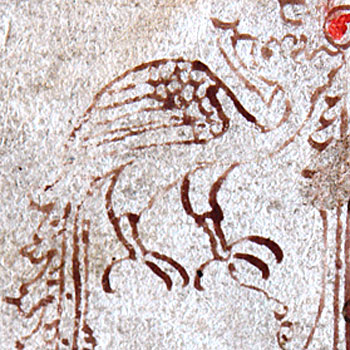Sir Tryamour
General Information
Plot Summary

Ardus, the king of Aragon, vows to go on crusade because he and his wife, Margaret, cannot have a child. Unaware that she has already fallen pregnant, he entrusts her to his steward Marrok and sets off for Jerusalem. As soon as he has gone, Marrok propositions the queen, who rejects him angrily. When Ardus returns, the treacherous steward claims that Margaret’s pregnancy is the result of an adulterous affair and advises the king to send her into exile. When he does so, Marrok ambushes the queen and her companion, an elderly knight called Roger, intending to rape her. Sir Roger and his greyhound, Trewelove, fight valiantly and Margaret escapes, but Marrok kills Roger. Trewelove buries his master and mourns at his graveside. After seven years, Trewelove returns to the court, and avenges Roger by ripping out Marrok’s throat. Ardus recognises the dog, and realises his steward’s betrayal. He ceremoniously reburies Roger, and sorrows over the loss of his queen.
Meanwhile Margaret reaches Hungary, delivers her son, Tryamour, and is taken in by a knight called Barnard. When the King of Hungary dies several years later, his barons arrange a tournament to find a husband for his daughter, Helen. Tryamour, who is handsome and strong, borrows armour from Barnard and enters the contest despite his youth. He defeats many noble knights -including his father Ardus and Sir James, son of the Emperor of Almayn - and is proclaimed the winner. The jealous James ambushes Tryamour, but Ardus and Barnard come to his aid and he slays James, then leaves the field and returns to his mother. When she realises her champion is missing, Helen refuses to marry another knight.
The Emperor is furious about his son’s death, and attacks King Ardus, who proposes trial by combat. Ardus’ messengers cannot find Tryamour, but the young knight eventually arrives in Aragon and, after a scuffle with the King’s foresters, agrees to act as his champion. After a lengthy battle, he defeats the Emperor’s knight Moradas, and Ardus makes him his heir. Tryamour then travels to Hungary, where two of Moradas’ brothers are lying in wait for him. He defeats them, as well as a third brother who is besieging Helen’s castle, and is finally able to marry his lady. Before their wedding, Tryamour sends for Margaret, who reveals that Ardus is his father. The King is invited to the wedding and is joyfully reunited with his wife. Tryamour is crowned King of Hungary, and he and Helen have two male children. After Ardus’ death, he makes one of them King of Aragon.
From: Jennifer Fellows, Of Love and Chivalry: An Anthology of Middle English Romance. London: J.M. Dent, 1993.
Manuscript: Cambridge, University Library Ff.2.38.
Manuscripts
Click a title below to search for all romances in that manuscript.